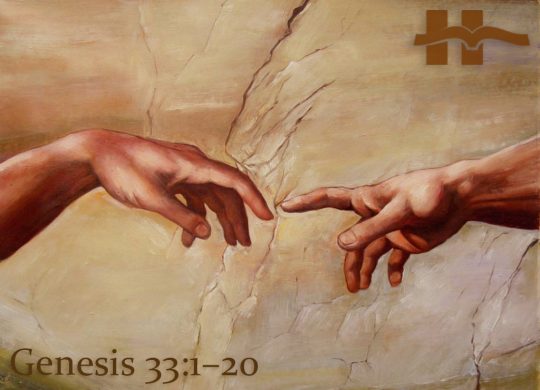Genesis 33:1−20

Faith in God is marked by seeking and extending forgiveness, thus restoring relationships with others, and also with God.
The previous pericope depicted Jacob finally receiving God’s blessing. That would have been a blissful ending to the turbulent story of the patriarch. However, one more thing needed to be accomplished: reconciliation with Esau.
And so, as younger brother comes before his older sibling, Jacob prostrates himself seven times (33:3)—a mark of great respect of vassal towards overlord. Whereas father Isaac had once blessed (younger) son with the words, “Your mother’s sons will bow to you,” now the blessed son is himself bowing to his brother. He whom others would “serve” (27:29), is now “servant” of another (33:5, 14; also 32:18, 20)—an inversion! And literally, here, Jacob’s face is in the ground (33:3). What else would happen?
Notice that Jacob bows seven times (33:3), a reflection of the sevenfold blessing of Isaac to Jacob—the latter is specifically addressed in seven items in 27:28–29: “may God give you …”; “may peoples serve you”; “may nations bow to you”; “may you master your brothers”; “may your mother’s sons bow to you”; “may they be cursed who curse you”; “and may they be blessed who bless you.” Another inversion.
The reunion is powerful beyond words: Esau runs to Jacob, embraces Jacob, falls on Jacob’s neck, kisses him, … and they weep (33:4). It was not one-sided. Both parties had felt the pain of a ruptured relationship and now both parties rejoice in tears at the restoration thereof.
One remembers that the “neck” that Esau kisses was the same “neck” that had once been covered with goatskins to deceive Isaac (27:16). It was also with another “kiss” that Jacob had stolen the blessing from Esau two decades ago (27:27). Inversion!
(Even the scribes transcribing the Hebrew Scriptures were stunned by Esau’s response. So much so, they put dots—puncta extraordinaria, found only rarely in the Old Testament—over each of the letters of the word translated “he kissed him” (wayyisshaqehu, 33:4), likely an indication of the copiers’ incredulity and doubt that this actually happened!)
And for the first time, Jacob acknowledges God’s “grace/favor” (33:5, also 33:11) upon his life, a fact obvious to readers earlier, but only now voiced by the protagonist himself.
The power of this reconciliation is manifested in the way Jacob’s plans are upended. His goal, in 32:20, was first to accomplish restoration of stolen goods (“cover his face with the present going before my face”), and then to achieve forgiveness for the felony perpetrated (“afterward I will see his face and perhaps he will lift my face”). But in Gen 33, it happens the other way around. First Jacob’s face on the ground is lifted up as Esau runs, embraces, falls on his neck, and kisses him (33:4)—forgiveness. Then comes the restoration (33:9–11), with yet another inversion. The first time, Jacob urges his brother to accept his “present” (33:10), but immediately he changes it to “gift” in 33:11 (berakah). Inversion! Why? Because while berakah can certainly mean “gift,” its primary meaning in Genesis is “blessing.” Jacob was returning the blessing he had stolen, as it were. The once-pseudo-Esau is restoring stolen goods to the real Esau, undoing his sins of the past by word and by deed. His humble and contrite conciliatory efforts mark Jacob’s faith in God.
And so the story ends with Jacob naming God “El Elohe Israel,” the God of Israel—the first time God, who had until now been the God of Abraham and of Isaac, now also becomes the God of Jacob/Israel!











 Abe Kuruvilla is the Carl E. Bates Professor of Christian Preaching at The Southern Baptist Theological Seminary (Louisville, KY), and a dermatologist in private practice. His passion is to explore, explain, and exemplify preaching.
Abe Kuruvilla is the Carl E. Bates Professor of Christian Preaching at The Southern Baptist Theological Seminary (Louisville, KY), and a dermatologist in private practice. His passion is to explore, explain, and exemplify preaching.